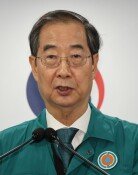`Disappointed by Souths indifference to Norths violation of human rights`
`Disappointed by Souths indifference to Norths violation of human rights`
Posted November. 04, 2013 07:05,
(We) will hold China responsible for human rights issues in North Korea in the final report to be presented to the UN Human Rights Council in March next year. Also (we) were disappointed by South Koreas indifference to human rights in North Korea.
Wrapping up the last three-month probe into North Koreas human rights abuses in Washington D.C., Michael Kirby, chairman of the U.N. Commission of Inquiry on Human Rights in North Korea, said in an exclusive interview with Dong-A Ilbo on Thursday, A separate section will be dedicated to China to report its negligence over human rights infringements by North Korea, including forced repatriation of North Korean defectors. The chairman who came from a two-day hearing in Washing D.C. to have the interview with Dong-A Ilbo at the Johns Hopkins School of Advanced International Studies also told the atmosphere during the interim report at the Third Committee of the UN General Assembly on Tuesday. He said, Criticisms from the 16 participating members were concentrated on China who had failed to meet the international conventions on refugees rather than on North Korea, adding, I tried to extend my hand to the Chinese representative, but he looked upset and hastily left the room after the meeting.
The commission on North Koreas human rights issues formed in March this year according to the UN resolution on North Korea adopted by the UNHRC held hearings in Seoul, Tokyo, London and Washington D.C. from August to hear testimonies to human rights violations in North Korea, including tortures, famine and sexual abuses. Mr. Kirby said that a report will be prepared in January based on the testimonies and data collected through artificial satellites and presented to the UN Human Rights Council in March.
Mr. Kirby also said that once site investigation is permitted, we will first go to the political prisoner camps because those places are the epicenter of human right infringement where the most serious abuses take place.
He said, (We) wrote a letter to North Korea and its leader Kim Jong Un three times to request our entry into the regime for investigation, adding, To the first letter, it responded it could not cooperate for political maneuvering against North Korea, but it did not even respond to the second and third letters.
He said, In the letter, we requested a meeting with the North Korean leader Kim, adding, I want to ask him why the country has become like this.
This former Australian judge with 35 years of experience said, As a judge, I have seen many heartbreaking stories, but the testimonies of North Korean defectors made me cry at the age of 74. The testimony of a defector in Washington D.C., in which a two-month-old baby boy died of hunger in the bosom of his 15-year-old sister, and another testimony in the Seoul hearing, in which a women who defected from North Korea and got married to a disabled Chinese man drowned her child to death not to be caught by Chinese security police, were among the many unforgettable stories he heard at the hearings.
As for including the measure of filing a petition with the International Criminal Court against the North Korean leadership in the report, which has been raised as a solution for the North Korean human rights issues, he said, Since China is likely to exercise its veto on the petition as a member of UN Security Council, the chance is not high.
The chairman who started the interview by saying that he was disappointed in South Korea heavily criticized South Koreas indifference to the North Korean human rights issues during the interview. When he came to Korea in August for a 10-day investigation, he was shocked that people other than some North Korean defectors and families of prisoners repatriated to the North were not interested in the issues. He said, I could not but sigh looking at the empty hearing room.
He said, Indifference of young Korean people is regrettable, pointing out that West Germany before the unification of Germany was different. He also added, West German students led by Berlin University raised the issue of human rights infringement committed by the secret police of East Germany to the public, and this played an important role in bringing global attention to the issue, and emphasized, Young people in Korea should play a leading role, not a supporting role, in bringing attention to the North Korean human rights issues.







